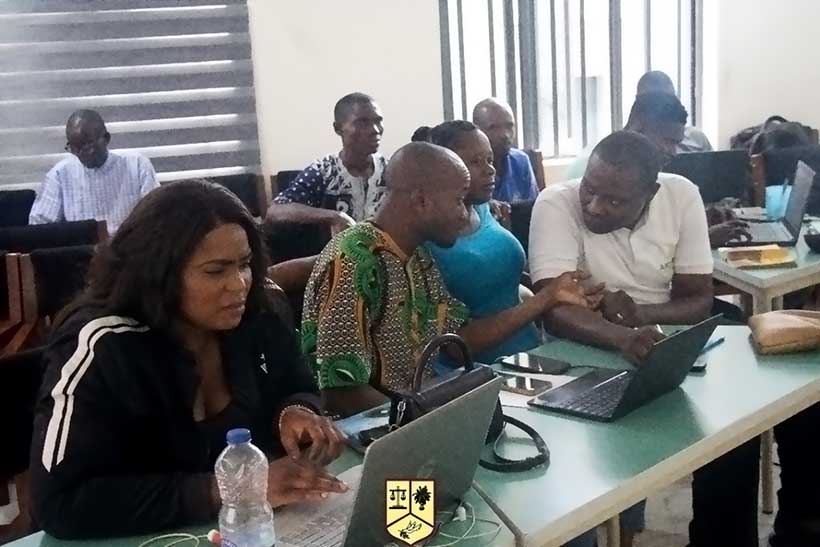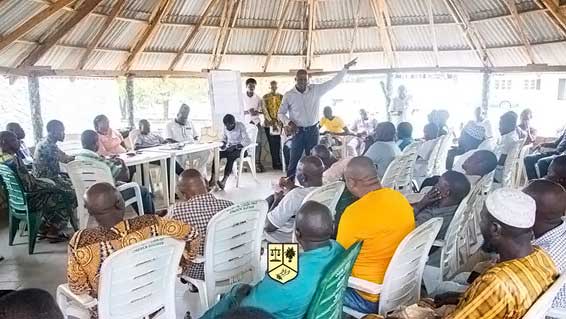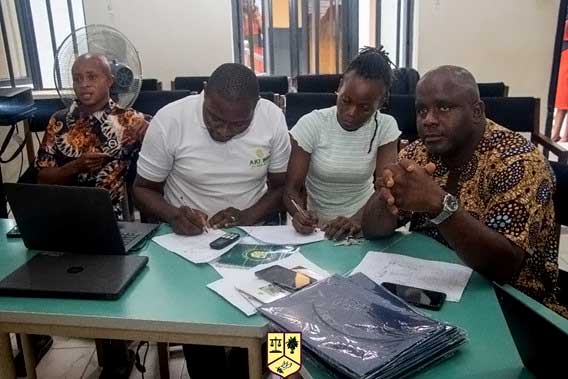There is rising interest in the use of Gender Transformative Approaches (GTAs) as strategic interventions to address underlying structural inequalities, especially gender norms that constrain women’s capacity and restrict their participation in agrifood systems. Following a series of studies, the Gender Equality Initiative selected a partner, the Justice Development and Peace Commission (JDPC), Ibadan, to co-design and implement GTAs at different scales and different components of the cassava agrifood system.
This blog highlights JDPC’s experience and insight in the process of co-designing the GTAs. The blog also provides the details of individual and organizational changes observed by JDPC, as well as the future plans in implementing the GTAs among actors in the cassava agrifood system in Nigeria.
Organizational perspective shifts
Before now, JDPC in line with the Sustainable Development Goal 5, implements strategies aimed at integrating gender in the organization activities and projects. However, many of these strategies are limited to increasing women’s participation and benefits in some of its project activities. With the commencement of the GTA co-design process, JDPC has recognized the need to change the gender approaches in its projects from being gender sensitive to transformative. This will address the underlying causes of gender inequalities, especially gender norms, and achieve equitable gender outcomes in its agrifood system projects. Confirming the shift, a Program Officer stated, “Based on the experience that we are gaining in the process of GTA co-design, in the Integrated Development Program which is an agricultural arm of the organization, we are facilitating plans for higher-level inclusion of females into leadership roles in farmers’ groups”.

JDPC GTAs Co-Design Team in a training session in the co-designing process.
Photo Credit: JDPC
Impactful moments in GTA co-designing process
Staff members of JDPC Ibadan recall series of memorable moments since the commencement of the GTAs co-designing process. For Taiwo Adesiji, a Program Officer in the Integrated Rural Community Development Project (IRCDP) department, the key moments was the rigorous and collaborative process of learning and knowledge-sharing in the development of baseline questionnaire and implementing the baseline study. “Prior to the GTAs baseline study, we have not engaged at such high-level in implementing gender focused data collection. The joint efforts in reviewing the GTAs questionnaire and implementing the baseline study served as a platform for gender capacity building for many staff of JDPC”, Adesiji narrated.
Anthony Adedeji, the JDPC Program Coordinator shared his memorable experience linked to his participation at the third high-level dialogue on gender and climate change, convened by HER+, the CGIAR Gender Equality Research Initiative, in Abuja, Nigeria in October 2024. During the dialogue, Adedeji had the opportunity to share updates on the GTAs co-designing process and made contributions to the gender transformative efforts implemented by the Gender Equality Initiative. “Through the Nigeria dialogue, I was able to meet many stakeholders working on issues of gender and agrifood systems in Nigeria. It was a great opportunity as I gained more knowledge on the importance of implementing GTAs to transform the agrifood system in Nigeria”, Adedeji explained.
Institutional level change
A positive spillover from the GTA co-design learning process is the identification of changes and practices that can enhance gender relations in JDPC organizational structure and projects. Jumoke Oluwadepo, an Assistant Program Officer pointed out, “Although JDPC has always been gender sensitive since its formation, with the involvement in the GTAs co-design process, JDPC will now ensure that its efforts and policy on gender issues target transformative approaches that will give more voice to women in the different farmers’ groups that the organization is working with.”

Programme coordinator facilitating a group discussion with JDPC led cassava group in Ibarapa East, Oyo State.
Photo Credit: JDPC

JDPC program officers in a group discussion during the GTA co-design process
Photo Credit: JDPC
Individual level change
At the individual level, the staff members of JDPC stated some of the changes they have observed during the co-design process. These include:
- Improved knowledge on the concept of gender norms and the roles the norms play in enforcing gender inequalities;
- Better understanding of the need for gender and social inclusion in pertinent issues in agriculture such as land and assets ownership;
- Need for stakeholders’ engagement and participatory approaches; and
- Improved communication skills and capacities in conducting gender focused data collection.
Giving more insights into some of these, a Program Officer explained, “The co-design process is helping me as an individual to understand more issues relating to women inclusion in land ownership. I also have knowledge on the norms that affect women in agriculture development, from women inability to buy or sell their productive assets, to restriction from the norms in taking up leadership roles in groups”.
Benefits of the GTAs co-design process
Highlighting the benefits they have gained from the co-design process during the implementation of the GTAs process, members of JDPC’ mentioned stakeholders’ engagement, gender and social inclusion, as well as enhanced team capacity and teamwork. The Program Coordinator mentioned, “Now in our organization, we have realized the importance of including all relevant stakeholders from the beginning in the process of fostering sustainable gender outcomes”. A Program Assistant in the organization also corroborated this, “Since the collaboration with Gender Equality HER+ initiative, the organization has been so firm with its gender policy, such that all our interventions give more voice to women, girls and people living with disability in our project areas. We provide the platform where their voices can be heard and they can speak their mind”.
Future plans
Sharing JDPC’s plan in implementing gender transformative changes in the organization agriculture and rural development projects, the Program Coordinator promised to build on the solid foundation laid through the GTAs co-design efforts. Adedeji confirmed that JDPC will continue to address gender normative constraints at all levels in the organization and in its future projects. “The organization will make efforts by building on the existing co-design approach to incorporate gender equalities outcomes especially those specified in the SDG 5 targets”, he alluded.
Conclusion
The GTA co-design process has been a new learning curve for JDPC. The lessons are valuable and will provide the platform to incorporate some of the key learnings in the organization and agriculture project activities. “Our partnership with the Gender Equality Initiative in co-designing GTAs will make our different gender intervention strategies rich and inclusive to cover all areas across gender, social, and economic dimensions”, the Program Coordinator assured.



No Comments